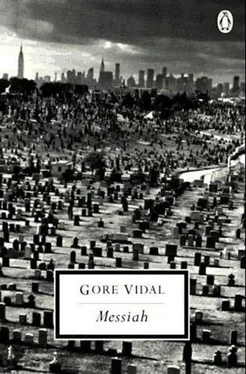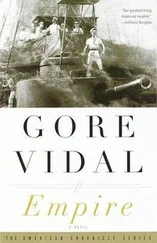Gore Vidal - Messiah
Здесь есть возможность читать онлайн «Gore Vidal - Messiah» весь текст электронной книги совершенно бесплатно (целиком полную версию без сокращений). В некоторых случаях можно слушать аудио, скачать через торрент в формате fb2 и присутствует краткое содержание. Жанр: Современная проза, на английском языке. Описание произведения, (предисловие) а так же отзывы посетителей доступны на портале библиотеки ЛибКат.
- Название:Messiah
- Автор:
- Жанр:
- Год:неизвестен
- ISBN:нет данных
- Рейтинг книги:3 / 5. Голосов: 1
-
Избранное:Добавить в избранное
- Отзывы:
-
Ваша оценка:
- 60
- 1
- 2
- 3
- 4
- 5
Messiah: краткое содержание, описание и аннотация
Предлагаем к чтению аннотацию, описание, краткое содержание или предисловие (зависит от того, что написал сам автор книги «Messiah»). Если вы не нашли необходимую информацию о книге — напишите в комментариях, мы постараемся отыскать её.
Messiah — читать онлайн бесплатно полную книгу (весь текст) целиком
Ниже представлен текст книги, разбитый по страницам. Система сохранения места последней прочитанной страницы, позволяет с удобством читать онлайн бесплатно книгу «Messiah», без необходимости каждый раз заново искать на чём Вы остановились. Поставьте закладку, и сможете в любой момент перейти на страницу, на которой закончили чтение.
Интервал:
Закладка:
Clarissa unfolded her mushroom omelet with a secret smile. "You'll meet our number-one committee member after lunch. He's coming, isn't he?" She looked at Hastings as though suspecting him of a treacherous ineptitude.
"Certainly, certainly, at least he said he was." Hastings motioned for the serving-woman to clean away the luncheon dishes and we moved to other chairs beside the pool for coffee. Clarissa was in fine form, aggressive, positive, serenely indifferent to the effect she was having on Hastings and me.
"Of course I'm just meddling," she said in answer to an inquiry of mine. "I don't really give two cents for Mr Cave and his message."
"Clarissa!" Hastings was genuinely shocked.
"I mean it. Not that I don't find him fascinating and of course the whole situation is delicious… what we shall do! or you shall do!" she looked at me maliciously. "I can foresee no limits to this."
"It no doubt reminds you of the period shortly after Mohammed married Khadija." My own malice, however, could not pierce Clarissa's mad equanimity.
"Vile man, sweet woman. But no, this is all going to be different although the intellectual climate (I think intellectual is perhaps optimistic but you know what I mean) is quite similar. I can't wait for the first public response."
"There's already been some," said Hastings, crossing his legs which were encased in pale multicolor slacks with rawhide sandals on his feet. "There was a piece yesterday in the News about the meetings they've been having up near Laguna or wherever it is he's been speaking this time."
"What did they say?" Clarissa scattered tiny saccharine tablets into her coffee like a grain goddess preparing harvest.
"Oh, just one of those short suburban notes about how a Mr Joseph Cave, they got the name wrong, was giving a series of lectures at a funeral parlor which have been surprisingly well attended."
"They didn't mention what the lectures were about?"
"No, just a comment: the first one so far in Los Angeles."
"There'll be others soon but I shouldn't think it's such a good idea to have too many items like that before things are really under way."
"And the gentleman who is coming here will be responsible for getting them under way?" I asked.
"Pretty much, yes. It's been decided that the practical details are to be left to him. Cave will continue to speak in and around Los Angeles until the way has been prepared. Then, when the publicity begins, he will be booked all over the country, all over the world!" Clarissa rocked silently for a moment in her chair, creating a disagreeable effect of noiseless laughter which disconcerted both Hastings and me.
"I don't like your attitude," said Hastings, looking at her gloomily. "You aren't serious ."
"Oh I am, my darling, I am. You'll never know how serious." And on that high note of Clarissa's, Paul Himmell stepped out onto the patio, blinking in the light of noon.
He was a slender man in his fortieth and most successful year, with hair only just begun to gray and a lined but firmly modeled face, bright with ambition. The initial impression was one of neatly contained energy, of a passionate temperament beautifully, usefully channeled. The twist to his bow tie was the work of a master craftsman.
The handshake was agreeable; the smile was quick and engaging; the effect on me was alarming: I had detested this sort of man all my life and here at last, wearing a repellently distinguished sports coat was the archetype of all such creatures, loading with a steady hand that cigarette holder without which he might at least have seemed to me still human. He was identified by Hastings who, with a few excited snorts and gasps, told me beneath the conversation that this was the most successful young publicist in Hollywood, which meant the world.
"I'm happy to meet you, Gene," he said as soon as Hastings had introduced us. He was perfectly aware that he had been identified while the first greetings with Clarissa had been exchanged: he had the common gift of the busy worldling of being able to attend two conversations simultaneously, profiting from both. I hate of course being called by my first name by strangers but in his world there were of course no strangers: the freemasonry of self-interest made all men equal in their desperation. He treated me like a buddy. He knew (he was, after all, clever) that I detested him on sight and on principle and that presented him with a challenge to which he rose with confidence… and continued to rise through the years, despite the enduring nature of my disaffection. But then to be liked was his business and I suspect that his attentions had less to do with me, with a sense of failure in himself for not having won me, than with a kind of automatic charm, a response to a situation which was produced quite inhumanly, mechanically: the smile, the warm voice, the delicate flattery… or not so delicate, depending on the case.
"Iris and Cave both told me about you and I'm particularly glad to get a chance to meet you… to see you too, Clarissa… will you be long in the East?" Conscious perhaps that I would need more work than a perfunctory prelude, he shifted his attention to Clarissa, saving me for later.
"I never have plans, Paul, but I've got one or two chores I've got to do. Anyway I've decided that Eugene is just the one to give the enterprise its tone… a quality concerning which you, dear Paul, so often have so much to say."
"Why yes," said the publicist genially, obviously not understanding. "Always use more tone. You're quite right."
Clarissa's eyes met mine for a brief amused instant. She was on to everything… doubtless on to me too in that way one can never be about oneself; I always felt at a disadvantage with her.
"What we're going to need for the big New York opening is a firm historical and intellectual base. Cave hasn't got it and of course doesn't need it. We are going to need commentary and explanation and though you happen to be a genius in publicity you must admit that that group which has been characterized as intellectual, the literate few who, in their weakness, often exert enormous influence, are not apt to be much moved by your publicity: in fact, they will be put off by it."
"Well, now I'm not so sure my methods are that crude. Of course I never…"
"They are superbly, triumphantly, providentially crude and you know it. Eugene must lend dignity to the enterprise. He has a solemn and highly respectable misunderstanding of philosophy which will appeal to his fellow intellectuals. He and they are quite alike: liberal, ineffectual, scrupulous, unsuperstitious, irresolute and lonely. When he addresses them they will get immediately his range, you might say, pick up his frequency, realizing he is one of them, a man to be trusted. Once they are reached the game is over, or begun." Clarissa paused and looked at me expectantly, the exuberant malice veiled by excitement.
I didn't answer immediately. Hastings, as a former writer, felt that he too had been addressed and he worried the subject of "tone" while Paul gravely added a comment or two. Clarissa watched me, however, conscious perhaps of the wound she had dealt.
Was it all really so simple? was I so simple? so typical? Vanity said not, but self-doubt, the shadow which darkens even those triumphs held at noon, prevailed for a sick moment or two: I was no different from the others, from the little pedagogues and analysts, the self-obsessed and spiritless company who endured shame and a sense of alienation without even that conviction of virtue which can dispel guilt and apathy for the simple, for all those who have accepted without question one of the systems of absolutes which it has amused both mystics and tyrants to construct for man's guidance.
I had less baggage to rid myself of than the others: I was confident of that. Neither Christianity nor Marxism nor the ugly certainties of the mental therapists had ever engaged my loyalty or suspended my judgment. I had looked at them all, deploring their admirers and servants, interested though by their separate views of society and of the potentialities of a heaven on earth (the medieval conception of a world beyond life was always interesting to contemplate even if the evidence in its favor was whimsical at best… conceived either as a system of rewards and punishments to control living man or as lovely visions of what might be were man indeed consubstantial with a creation which so often resembled the personal aspirations of gifted divines rather more closely than that universe the rest of us can only observe with mortal eyes). No, I had had to dispose of relatively little baggage and, I like to think, less than my more thoughtful contemporaries who were forever analyzing themselves, offering their psyches to doctors for analysis or, worse, giving their immortal souls into the hands of priests who would then assume much of their weltschmerz , providing them with a set of grown-up games every bit as appealing as the ones of childhood which had involved make-believe or, finally, worst of all, the soft acceptance of the idea of man the mass, of man the citizen, of society the organic whole for whose greater good all individuality must be surrendered.
Читать дальшеИнтервал:
Закладка:
Похожие книги на «Messiah»
Представляем Вашему вниманию похожие книги на «Messiah» списком для выбора. Мы отобрали схожую по названию и смыслу литературу в надежде предоставить читателям больше вариантов отыскать новые, интересные, ещё непрочитанные произведения.
Обсуждение, отзывы о книге «Messiah» и просто собственные мнения читателей. Оставьте ваши комментарии, напишите, что Вы думаете о произведении, его смысле или главных героях. Укажите что конкретно понравилось, а что нет, и почему Вы так считаете.












